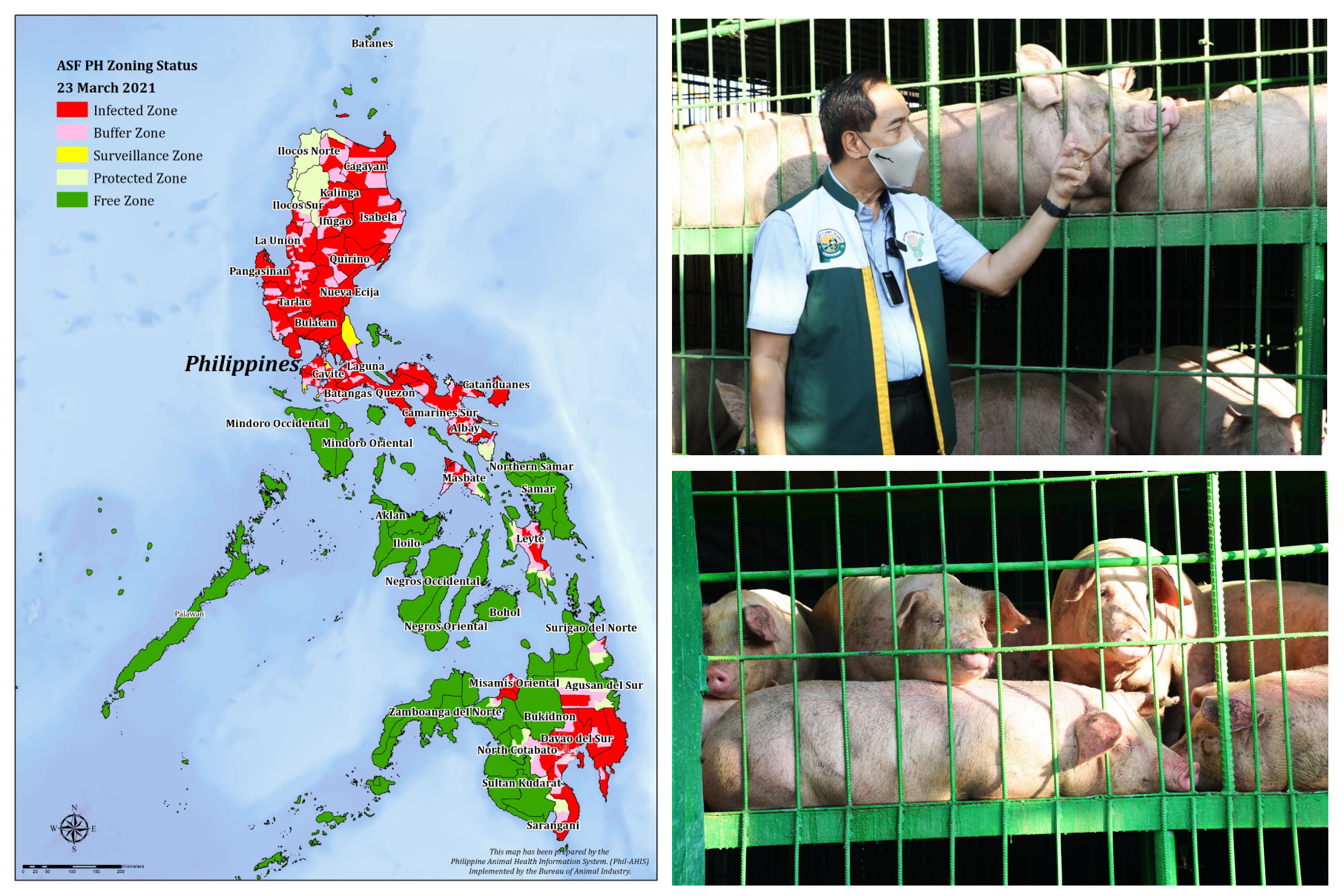
As the African Swine Fever (ASF) incidence is at its lowest level since August 2020, the Department of Agriculture (DA) is set to implement the government’s P600-million swine repopulation program, focusing initially on previously affected areas that are no longer under quarantine and now classified as “pink” and “yellow” zones.
“We are heartened that the ASF incidence is waning, which as of March 26, 2021, has registered 253 cases, versus 358 cases in January 2021, 330 cases in February 2021, and the highest level at 1,773 cases in August 2020,” said Agriculture Secretary William Dar.
The favorable development was reported by Director Reildrin Morales of the Bureau of Animal Industry (BAI), during a recent meeting presided by Secretary Dar with DA regional directors, Director Jocelyn Badiola of the DA-Agricultural Credit and Policy Council (ACPC) and President Jovy Bernabe of the DA-Philippine Crop Insurance Corporation (PCIC).
“This piece of good news boosts the Duterte administration’s swine repopulation program — or the Integrated National Swine Production Initiatives for Recovery and Expansion or INSPIRE — that will be implemented in ASF ‘pink’ and ‘yellow’ zones, and more extensively in ASF ‘green’ zones,” said Secretary Dar.
As per ASF color-coding scheme, Morales said “pink” zones serve as buffer, where ASF is not present but adjacent to an infected zone. It may also be an area previously infected but the ASF virus has not been detected for at least 90 days, and thus has recovered from infected status.
Other areas where the INSPIRE program will be implemented are the: “yellow” or surveillance zones, which are ASF-free but adjacent to “yellow” zones; and “light green” and “dark green” zones, which are free from ASF.
“We will implement INSPIRE through the ‘sentinel’ approach initially in the first eight regions affected by ASF, benefiting 8,000 backyard raisers, who will be grouped into 500 clusters,” said the DA chief. The eight regions are: 1, 2, 3, 4A, 5, 11, 12, and Cordillera.
The sentinel approach is the limited placement of pigs to ascertain if there is still ASF virus present in a test area.
DA Undersecretary for Livestock Dr. William Medrano said the project beneficiaries will each receive three to five “sentinel” piglets — including feeds, veterinary drugs, biologics and anti-viral agents — during the six-month fattening period. The sentinel component entails an initial budget of P400 million (M) under the INSPIRE program.
Another P200 M is allocated for the INSPIRE multiplier breeder component to ensure continuous source of piglets for the subsequent expansion of the swine repopulation program, said Medrano, who oversees the DA National Livestock Program.
Secretary Dar said reviving the country’s swine industry is a huge challenge, and requires a concerted effort among all stakeholders.
“We need the strong and sustained support of backyard and commercial raisers, local government units (LGUs), and the private sector to revive the industry,” said the DA chief. “First, by effectively controlling the ASF and preventing its spread via strict biosecurity measures, and secondly, by embarking on a massive swine repopulation program.”
This early, he thanked several private companies, led by the Univet Nutrition and Animal Healthcare Company (UNAHCO), that recently partnered with the DA to implement the “Bantay ASF sa Barangay” program, and the Land Bank of the Philippines as it launched a P15-billion SWINE financing program to support the Duterte administration’s INSPIRE initiative. The Development Bank of the Philippines has also set aside P12B for lending to commercial hog raisers.
Several LGUs are also joining the campaign to revive the hog industry, like the city government of Lipa in Batangas that is investing an initial P1.6 M to embark on a gilt (young female breeder pig) dispersal program, according to DA-4A regional director Vilma Dimaculangan. It also allocated P1M for animal disease monitoring and prevention, she added.
The DA through its International Training Center on Pig Husbandry (ITCPH) is also establishing swine breeder multiplier farms, initially in eight provinces, namely: Ilocos Norte, Bataan, Nueva Ecija, Mindoro, Sorsogon, Southern Leyte, Bohol, and Bukidnon.
Further, the DA-ACPC is extending a P500-M credit program for backyard raisers in “green zones” to expand their operations.
Finally, the DA through the PCIC will provide free insurance premium to backyard raisers listed under the RSBSA, and subsidized premium for commercial raisers. Should their fatteners die due to ASF, they will be indemnified at P10,000 per head.
“This early, we sincerely thank our partners — local chief executives, the private sector, hog raisers’ groups, and veterinary associations — for extending their strong support to revive the country’s swine industry,” concluded secretary Dar. ### (DA StratComms)














